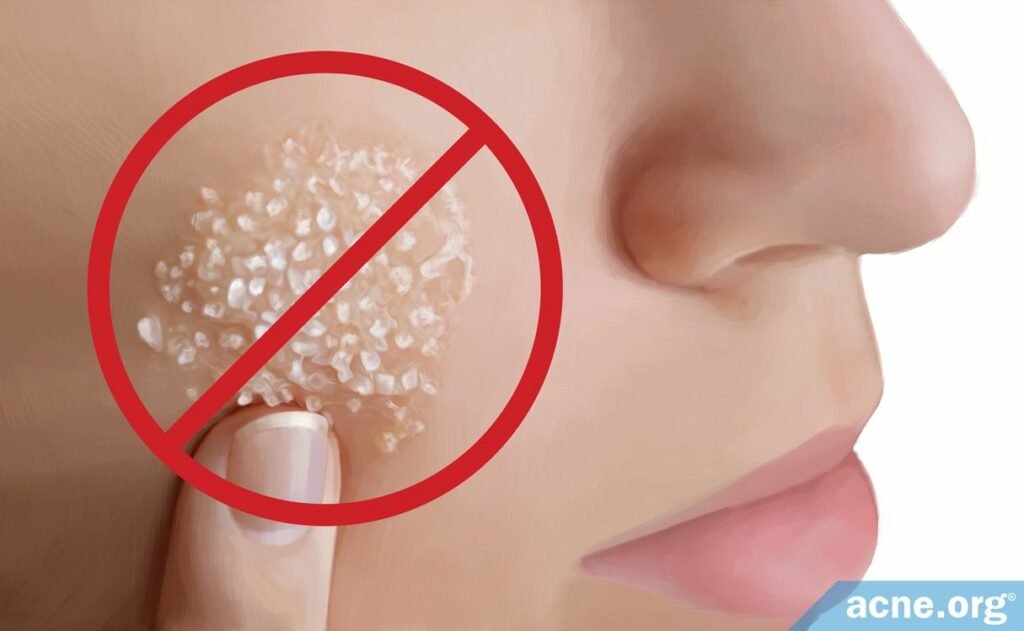Using a face scrub can lead to pimples due to the scrub damaging the skin, causing irritation and inflammation. The abrasive nature of some face scrubs can lead to micro-tears in the skin, creating an entry point for bacteria and dirt, resulting in breakouts.
It can also strip away the skin’s natural oils, leading to excess oil production and clogged pores. In some cases, certain ingredients in face scrubs can be too harsh for the skin, causing an adverse reaction and leading to acne.
Understanding the specific needs of your skin and choosing a gentler, non-comedogenic face scrub can help prevent pimples and promote healthier skin.
Contents
The Science Behind Pimple Formation
When it comes to understanding why pimples can appear after using a face scrub, it’s important to delve into the science behind the formation of pimples. This helps us better understand the relationship between face scrub use and the occurrence of pimples, offering valuable insights into effective skincare practices.
The Role Of Skin Pores
Skin pores play a crucial role in the development of pimples. These tiny openings help in the release of oils and sweat, contributing to the maintenance of skin health. When these pores become clogged with impurities such as dirt, excess oil, or dead skin cells, it paves the way for pimple formation.
The Impact Of Face Scrub On Skin Composition
Using a face scrub can have varying effects on the composition of the skin. While face scrubs help in removing dead skin cells and unclogging pores, overuse or harsh scrubbing can lead to irritation and inflammation, triggering the formation of pimples. On the other hand, using a face scrub in moderation and with gentle application can promote healthier skin by aiding in the removal of impurities.

Factors Leading To Pimple Breakouts
Possible Irritants In Face Scrubs
Several face scrubs contain potential irritants that can lead to pimple breakouts, especially for individuals with sensitive or acne-prone skin. Ingredients such as sulfates, parabens, and fragrances can cause irritation, redness, and clogged pores, potentially leading to acne formation. When choosing a face scrub, it’s essential to carefully inspect the ingredient list and opt for products that are labeled as non-comedogenic and formulated for sensitive skin.
Over Exfoliation And Skin Damage
Over exfoliating the skin through the frequent or aggressive use of face scrubs can disrupt the skin’s natural barrier, leading to microscopic tears and irritation. This can subsequently result in increased sebum production and clogged pores, contributing to the development of pimples. To prevent over-exfoliation, it’s vital to use face scrubs as recommended by the manufacturer and ensure that the exfoliation frequency aligns with your skin type and sensitivity.
Understanding Skin Types And Sensitivities
After using a face scrub, you may experience pimples if it doesn’t suit your skin type. Using a harsh scrub can strip your skin of its natural oils, leading to breakouts. It’s essential to understand your skin type and sensitivities to choose the right skincare products for a clearer complexion.
Variations in Skin Reactions
When it comes to using face scrubs, it’s crucial to understand that each person’s skin is unique and may react differently to different products. The variations in skin reactions can be influenced by factors such as genetics, lifestyle, and environmental exposures. It’s essential to be aware of the potential for skin sensitivity and any underlying skin conditions that may impact how your skin responds to face scrubs.
Identification of Individual Skin Needs
Identifying your individual skin needs is the key to ensuring that the products you use, including face scrubs, are suitable for your skin type. The effectiveness of a face scrub can vary depending on whether you have oily, dry, combination, or sensitive skin. Tailoring your skincare routine to meet the requirements of your specific skin type can help minimize the risk of developing pimples or irritation after using a face scrub.
Tips for Identifying Your Skin Type
– Take note of how your skin feels after cleansing.
– Consider any areas of dryness or excessive oiliness.
– Pay attention to how your skin reacts to different products.
Understanding your skin type and sensitivities allows you to make informed decisions when selecting skincare products, including face scrubs. By taking the time to assess and recognize your skin’s unique needs, you can minimize the likelihood of experiencing adverse reactions and breakouts.
It’s important to remember that what works for someone else may not necessarily work for you. By understanding your skin type and sensitivities, you can take proactive steps to choose products that are best suited to your individual needs, promoting healthier and clearer skin.
Proper Use Of Face Scrubs
Proper use of face scrubs is crucial to reap the benefits without experiencing unwanted side effects such as pimples. Although face scrubs can be effective in removing dead skin cells and impurities, improper use can lead to skin irritation and breakouts.
Frequency And Application Techniques
It’s important to use face scrubs in moderation. Excessive exfoliation can strip away the skin’s natural oils, leading to dryness and irritation. Ideally, using a face scrub 2-3 times a week is sufficient for most skin types. When applying the product, gently massage it into damp skin using circular motions, avoiding the delicate areas around the eyes. Rinse thoroughly with lukewarm water to remove any residue.
Choosing The Right Product For Skin Type
Selecting a face scrub that suits your skin type is essential to prevent pimples and other adverse reactions. For sensitive skin, opt for a gentler exfoliant with smaller granules, while those with oily or acne-prone skin may benefit from a charcoal-based scrub to help absorb excess oil and impurities. Be mindful of the ingredients, and avoid harsh chemicals or abrasive particles that could potentially aggravate the skin.
Importance Of Hydration And Moisturization
After using a face scrub, it’s common for some individuals to experience pimples or breakouts. This can be attributed to the way the skin responds to the exfoliation process. While exfoliation is crucial for removing dead skin cells and uncovering a fresh layer of skin, it can also strip away natural oils and disrupt the skin’s natural moisture balance. This disruption can result in increased sebum production and potential blockages in the pores, leading to pimples.
Balancing Skin After Exfoliation
Balancing the skin after exfoliation is key to preventing post-scrub pimples. Following exfoliation, the skin needs to be nourished and replenished to maintain its moisture balance. Choosing the right products for post-scrub care is essential in preventing breakouts.
Effective Moisturizing Routines
Effective moisturization is crucial to maintaining skin health. After using a face scrub, it’s important to follow up with a suitable moisturizer that provides adequate hydration. Opt for lightweight, non-comedogenic formulas that won’t clog the pores. Ensure that the moisturizer is applied evenly to all areas of the face, focusing on any dry or irritated patches.
Additionally, incorporating hydration-boosting ingredients such as hyaluronic acid can help to attract and retain moisture within the skin, promoting a healthy and balanced complexion.
Seeking Professional Advice
When To Consult A Dermatologist
If you experience persistent or severe breakouts after using a face scrub, it may be wise to seek professional advice from a dermatologist. Even if you’ve tried other acne treatments or adjusted your skincare routine without success, consulting a dermatologist can provide you with tailored solutions to address your specific skin concerns. Any sudden or severe skin reaction post-face scrub usage should not be overlooked, and seeking professional help becomes imperative.
Customizing Skincare Routines For Personal Needs
Every individual’s skin type is unique, and what works for one person may not work for another. Understanding the need for customizing skincare routines is essential in addressing post-face scrub pimple breakouts.
By seeking professional advice, you can receive personalized recommendations on suitable face scrubs, frequency of exfoliation, and complementary acne-fighting products that align with your skin’s specific needs. Embracing a personalized skincare routine enhances the effectiveness of your products, minimizing the likelihood of experiencing post-face scrub pimples.
Frequently Asked Questions
Why Does My Skin Break Out After Using Face Scrub?
It’s possible that the face scrub is too harsh, causing irritation and breakouts.
How Can I Prevent Pimples After Using A Face Scrub?
Choose a gentle, non-comedogenic face scrub and avoid over-exfoliating to prevent breakouts.
Are Certain Ingredients In Face Scrubs Causing My Pimples?
Yes, some scrubs contain harsh ingredients that can clog pores, leading to pimples and acne.
Can Over-exfoliating With A Face Scrub Cause Pimples?
Yes, over-exfoliating can irritate the skin and lead to increased oil production, resulting in pimples.
What Alternative Skincare Routines Can Help Prevent Pimples?
Consider using a mild cleanser, gentle exfoliant, and oil-free moisturizer to maintain clear skin after scrubbing.
Conclusion
It’s important to choose the right face scrub for your skin type to prevent pimples. Consider using a gentle exfoliant and avoid overdoing it. Remember to moisturize after scrubbing to keep your skin hydrated. Don’t forget to consult a dermatologist if your pimples persist.
Your skin deserves the best care!





